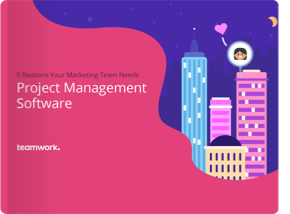Now that you know why project management is so important and you understand what a project manager actually does, you might be wondering how you can become a project manager yourself.
Being a project manager is a rewarding career. It’s a role that gives you an opportunity to make a real difference to a company’s bottom line. And as demand for project-based work grows, the Project Management Institute projects (heh) that employers are going to need to fill 2.2 million new project-oriented roles each year through 2027.
2.2 million.
Each.
Year.
That is, to use the technical term, absolutely bonkers.
With that kind of opportunity on the horizon, and with all the development opportunities for managers that come with it, it’s no wonder that more and more people are exploring the project manager career path and looking to learn how to become a project manager.
Whether you plan to go the traditional route and want to know what degree you need to become a project manager, or whether you’re one of the thousands of people who are already managing projects every day wondering how to become a project manager without experience, we’ve broken down everything you need to know to become a project manager in our definitive guide.

Becoming a project manager: some frequently asked questions
To get started, let’s take a quick look at some of the most frequently asked questions about becoming a project manager.
You’re a busy person. You probably have projects to manage right now! So if you’re just here for the TL;DR, we’ve compiled some of the most frequently asked questions about how to become a project manager.
This is the rapid-fire breakdown for when you have things to do and places to be.
Looking for some more comprehensive, in-depth insights? Keep reading for more on how to become a project manager.
What is a project manager?
A project manager is someone who is responsible for managing a piece of work from concept to delivery.
Who is a project manager?
Anyone who manages projects (i.e. pieces of work) from beginning to end is a project manager. That includes people with “project manager” in their job title or job description, of course — but it also includes people who oversee, coordinate and deliver on work regardless of their defined role.
How do I become a project manager?
There are two main roads on the career path to becoming a project manager. You can either go the “traditional” route — i.e. set out to become a project manager, get a qualification, and take a role as a project manager. Or you can keep gaining project management experience and working your way up the project management career ladder without a degree, certification, or other “classical” project manager education.
What degree do you need to become a project manager?
Being a project manager is about more than just degrees and qualifications. While there are lots of certifications you can take if you want to, having a degree is not required. There are many other steps to becoming a project manager that you can take.
Awesome! So how do I become a project manager without experience?
Whoa, slow down there. We didn’t say that.
Do you need a degree to become a project manager? Not necessarily. Do you need project manager experience? Yes, yes you do. In fact, the career path to becoming a project manager without a degree is all about developing your hands-on project management experience.

But don’t worry, it’s not quite the chicken-and-egg situation it sounds like. Project manager experience — and the project manager skillset — is probably something you’ve been developing without even realizing.
So if you’re looking to become a project manager without experience, the first thing to do is…start getting experience in project management. (And if you’re wondering, we have more detailed tips on how to do that below.)
Phew. Now that we’ve covered the basics, let’s focus on the specifics.
How do I become a project manager?
As mentioned above, nowadays there are two types of project manager.
The “traditional” project manager:
Someone who intentionally embarked on the project management career path and has a degree or qualification in project management.
The non-project manager project manager:
Also known as an accidental project manager. These are the people who never set out to become project managers but who find themselves managing projects as part of their daily work anyway. NPMPMs can be anyone: marketers planning a campaign, product managers coordinating the development of a new product, web designers creating a new website. They walk among us.
For anyone wondering how to become a project manager, this is good news: it means that there are more ways than ever to get on that project management career ladder.
Let’s start with the NPMPM or accidental project manager route.

Pathway 1: How to become a project manager without a qualification
Earlier in this guide, we talked about how more people are already project managers than they realize.
Most work involves projects. And most projects involve lots of moving parts — like research, planning, budgeting, coordinating, managing resources, and much more — that all need to be managed and overseen correctly to make sure that your project stays on track.
If you’re starting to find that you’re loving the thrill of the project management side more than any other aspect of your job, here’s how to break into project management without a degree.
1. Learn where the gaps in your project management knowledge are
Whatever role you’re currently in — marketer, designer, developer, whatever — you’ve likely been honing your project management skills all along.
According to the Project Management Institute’s Guide to the Project Management Body of Knowledge (or PMBOK Guide), there are 10 key project management “knowledge areas”:
Integration management
Scope management
Schedule management
Cost management
Quality management
Resource management
Risk management
Communications management
Procurement management
Stakeholder management
Think about the projects you’ve been on lately. Which of these areas have you been involved in?
Maybe you played an integral role in outlining the project plan, timeline, or scope.
Maybe you were the one who outlined the budget and were able to stop things going off-track when unexpected costs came up.
Maybe you helped to reallocate resources across team members to ensure that no one was over capacity.
Those are all project management skills that any great project manager needs to know.
On the flipside, maybe you haven’t had much exposure to some of the other knowledge areas, like risk management or stakeholder management. In that case, you know exactly what you need to focus on to gain the experience you need to become a more well-rounded project manager.
2. Get (more) project management experience
Once you’ve identified where you need to grow, it’s time to start putting your plan into action. (Which is what project managers do every day — double win!)
That’s because the #1 thing you can do if you want to become a project manager without experience is start getting that experience.
Projects are all around us, so volunteer when you can. Take on extra responsibilities and develop your organizational skills, scheduling skills, people management skills — everything you identified in step one.
3. Learn everything you can about project management
Always seek out opportunities to develop your project management skills and knowledge.
Learn by doing. Learn on the job. Learn from your mistakes. Learn from other project managers (in your company or elsewhere). See if you can find a mentor who’ll teach you their project manager tips.
If you want to pursue your project manager education but you don’t yet feel ready to fully commit, take one of the many online project management courses available on platforms like Udemy or Coursera.
You can also look for conferences or local networking events that will help you to stay on top of new industry trends and meet people who can help you to navigate the project management career path.
4. Start using the right project management software
Using a pm tool can help you to develop your project manager experience.
It allows you to automate your work, quickly assign tasks to groups of teams, and easily view projects in Gantt charts, as well as being able to manage all of your project resources from one place.
Using a flexible and intuitive project management tool like Teamwork.com to manage your work also means that you can get up and running without needing to spend a ton of time on training or onboarding.

Online Gantt chart maker
Create your own detailed Gantt chart with Teamwork.com to better manage your project timeline and stay on track.

Pathway 2: How to become a certified project manager
Whether you’ve been an accidental project manager for a while and you’re looking to add a formal qualification to your CV, or have always known that you wanted to be a project manager when you grew up, a qualification is a great way to signal your expertise and commitment to the PM career path to employers.
Even though a formal qualification is no longer a necessity to become a project manager (see: all of the above), it’s still worth considering if you’re really serious about upping your project management game.
Not only will it make more job opportunities available to you and give you a higher earning power, but it will also teach you some project management best practices and techniques that you might not otherwise have been exposed to.
Here’s what you need to know if you want to become a certified project manager.
1. Identify which project management certification is right for you
PMP, PRINCE2, CAPM, PMI-ACP…there’s a whole alphabet of project management degrees. It can be overwhelming. So how do you know which project management certification is right for you?
The first step is to check out your options. Which qualification is most common in your industry? Which one do you see listed most in the kind of job descriptions you’re interested in? Which one is best suited to your available time and budget? Which one will better fit the kind of processes your company uses? Where in the world do you want to work?
There’s lots to consider. Here’s an overview of some of the most popular degrees for project managers, to help start your formal project manager education.
Project Management Professional (PMP)
The Project Management Professional (PMP) is a certification offered by the Project Management Institute (PMI), the leading global organization for project management professionals.
t’s one of the most popular and well-recognized qualifications in the field — and it can have a major impact on your salary. According to the PMI, project managers (and other project management professionals such as PM consultants, PM specialists, and program managers) with PMP certifications report 23% higher salaries on average.
The PMP qualification is based on the PMI’s standards and guidelines as outlined in A Guide to the Project Management Body of Knowledge, or PMBOK Guide.
It’s aimed at people who already have project management experience (at least 4,500-7,500 hours of it, to be specific), as well as either 35 hours of project management education or a CAPM certification.
So while it’s not for absolute beginners, it’s definitely one to consider as you build out your project management portfolio.
For more on the requirements and process, check out the official PMP site here.
Projects In Controlled Environments (PRINCE2)
PRINCE2 stands for PRojects IN Controlled Environments, which also emphasizes how it differs from a PMP certification.
While the PMP certification is knowledge-based — i.e. it focuses on general project management knowledge and best practices for each stage of the project — the PRINCE2 is project- and process-based method in and of itself.
Unlike the PMP, it doesn’t have the same prerequisites, so it might be more suited to someone looking for a PM grounding at the beginning of their project management career. It also comes in both Foundation and Practitioner flavors for every stage of your project management journey.
If you’re trying to decide between a PMP and a PRINCE2 certification, there are a few other factors that should influence your decision, such as industry and geographical location (both of which can affect which qualification is preferred).
Ultimately, it’s not an either-or situation. Both certifications have benefits, and the two certifications can actually complement each other.
Learn more about getting a PRINCE2 certification here.
Certified Associate In Project Management (CAPM)
The Certified Associate in Project Management (CAPM) is an entry-level project management qualification offered by the PMI. It can be a standalone certification, or you can use it as one of the “prerequisites” needed to progress to getting a PMP.
The CAPM provides you with a foundational knowledge of project management based on the standards and guidelines outlined the PMBOK Guide.
Learn more about the CAPM certification here.
Agile certifications
If you work in an industry where agile practices are the norm, you might decide to get an agile certification instead (or as well!).
The PMI offers a qualification specifically designed for agile practitioners, the PMI Agile Certified Practitioner (PMI-ACP).
There’s also an agile-specific PRINCE2 certification, PRINCE2 Agile, which is available at both Foundation and Practitioner levels.
Depending on which agile methodologies you (and your organization) prefer, you could also choose to specialize even more. For example, if you’re a Scrum aficionado, you might decide to become a Certified ScrumMaster with the Scrum Alliance.
It all depends on what processes and frameworks your industry (and company) prefers to use — so do your research, talk to others in the field, and decide what the best agile certification for you is.
2. Get (and maintain) your qualification in project management
You probably thought there was going to be more steps to becoming a certified project manager than just:
Decide which project management certification you want.
Get the certification.
But once you’ve decided which project management certification is right for you, it’s all about knuckling down, putting in the hours, and preparing for the certification exam. You might also need to log more practical hours as well as making time for all the book-learning.
There are lots of prep courses available online that can help you to study and prepare for the exam, but ultimately, it’s all about putting in the time and effort. (You can do it! We believe in you!)
Then once you’ve got your certification, you need to maintain it.
Most project management certifications — such as the PMP — expire after a few years. This means that you’ll need to retake the exam every few years to show that you’re still up-to-date with PM best practices and standards.
3. Master the tools of the trade
As a project manager, you’re always looking for ways to increase efficiency and improve processes.
Finding the right project management tool will help you to put everything you’ve learned in your project manager education into practice. It allows you to oversee your projects with more clarity, forecast more accurately, manage your resources more efficiently, and report more precisely.
A good project management tool amplifies the work of the project manager: it helps you to take care of the everyday details so you can focus your skills where they’ll have the most impact. It works with you to elevate your best practices and scale your project successes — so learning how to use your PM tool to your advantage is essential, and will save you tons of time and money in the long run.
Teamwork.com was built to support you and your workflow, regardless of which project management methodology you use. Whether you need a Gantt chart or a kanban board, it has all the features you need to deliver your project, your way.

How to roll out Teamwork.com like an award-winning PMO
Find out how companies around the world use Teamwork.com to transform their workflows and help their teams to become happier and more productive
TL;DR: The steps to becoming a project manager
Start managing projects.
Keep managing projects.
Learn the skills and theory behind managing projects.
Use Teamwork.com to manage your projects.
Get better at managing projects.
Decide if you want to get a project management certification.
Continue to manage projects.


